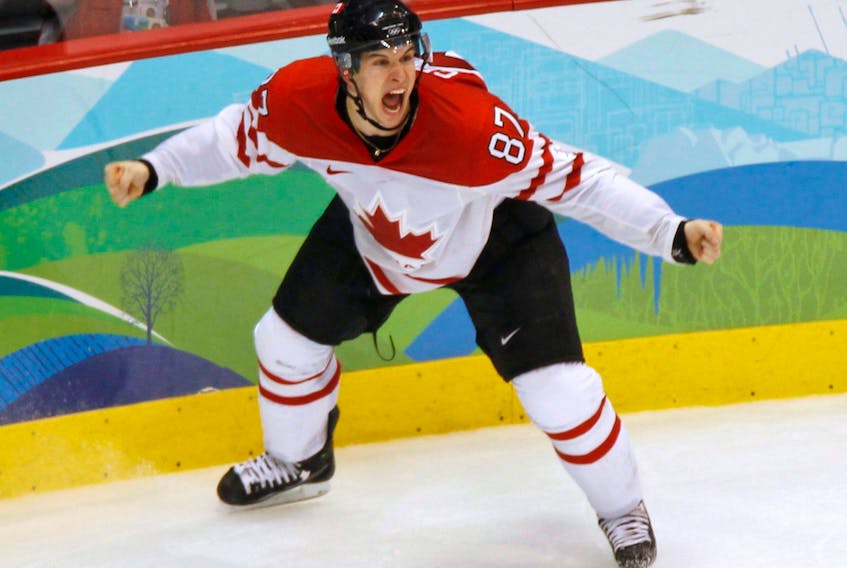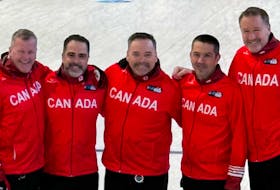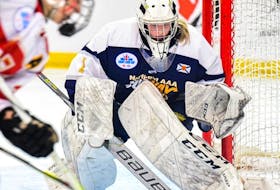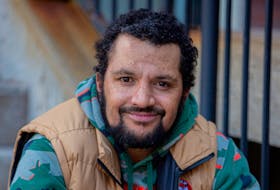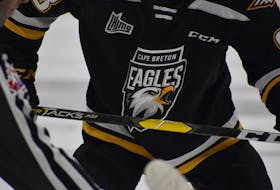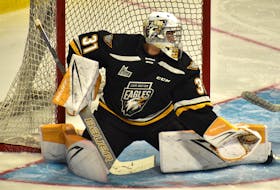There was no way in hell Sidney Crosby was not getting that puck. His teammate heard him call for it. I swear the entire sold-out crowd at what was known at the time as Canada Hockey Place heard No. 87 in red and white, shout, “‘Iggy! Iggy! Iggy!’“
“Oh yeah,” said Jarome Iginla, with his persistent smile, especially so now that Canada had won Olympic gold. “He was yelling for it. … He wanted it.”
Wednesday will mark 10 years since the start of the 2010 Vancouver Winter Olympic Games, maybe the single greatest sporting moment in this country’s history.
Twenty-six medals in total, including a record 14 gold, most in the history of the Winter Olympics.

I was there, covering the Games for the outfit which was The Telegram’s parent company at the time. Vancouver, and the entire country, was on wheels, whipped into frenzy on Feb. 28, 2010, when Sidney Crosby scored what would become known as the “Golden Goal” almost eight minutes into OT to beat the Americans 3-2 in one of those “where were you?” moments.
It stands as the greatest game ever played in Canada — with apologies to those who were at Copps Coliseum in Hamilton, Ont., in September 1987 — to see Gretzky-to-Lemieux in the final game of the Canada Cup.
The Yanks led the medals parade in Vancouver with 37, but who cares. They could have the podium. We got what mattered — gold in hockey.
Twice.
In ‘72, we were supposed to win … our best would slap on the skates and thump the unknown Russians. We were supposed to win the Canada Cups, too. Because we had the hockey players named Gretzky and Lemieux and, in 1976, Orr.
But in 2010, the U.S. was emerging as a worthy foe. American goalie Ryan Miller would be the Olympic tournament MVP. Brian Rafalski of the States was named best defenceman.
But Canada had Crosby.
“That’s Sid for you,” said Canadian centre Ryan Getzlaf. “There’s a reason he’s the best player in the world. He shows up in those big moments.”
They ended in glory, but early on, these weren’t shaping up to be the, “best Games ever.”
The endless babble concerning Vancouver’s place in Olympic history continued with the foreign press — and some domestic reporters, too — taking great delight in pointing out a series of faux pas that had in some cases saddled Vancouver.
The Games had not been without their hiccups. Broken down buses. Drivers hired over the phone getting lost. Erectile dysfunction with one of the torches during the opening ceremonies, which failed to rise from the floor of B.C. Place during the Opening Ceremonies.
The torch, the very symbol of the Olympics, cordoned off from the public by a chain link fence.
And, of course, tragedy, with the death of a Georgian luger on the track in practice. That brought into question whether a little more caution could have come into play with the design of the Whistler Sliding Centre, which scared the bejeezus out of most of the lugers, skeleton athletes and bobsledders. Some countries suggested the Canadians should have allowed athletes from other countries more training time on the track.
But, of course, there were wonderful memories, too, like seeing Gretzky clamber aboard the back of a pickup truck and make his way through Vancouver’s streets with the Olympic torch in hand … the ultimate Canadian moment.
There was my first visit to a ski-jumping facility, where you truly get an understanding of the height of the tower from which these people hurl themselves.
Picture flinging yourself off Atlantic Place on skis, at speeds approaching 95 kilometres per hour.
It was in Whistler at the ski-jump venue where I met 17-year-old Eric Mitchell of Calgary.
He took his first leap at age 11. But it wasn’t off one of the big jumps at Calgary’s Olympic Park.
“That’s suicide,” he said.
So what must a jumper do to prepare for his or her first go at it?
“First of all,” he said, half-jokingly (I think), “you have make sure your skis are on right.”
Of course.
But this is Canada, right? And if the Crosby-led hockey team had failed to win gold, chances are those Games would not really have been deemed a success.
Had Kaillie Humphries run over a pothole on the bobsleigh track and finished out of the medals, or Kevin Martin shanked his last shot to finish second or third in curling, there would have been a collective groan of discontent echoed across the land.
“Too bad,” a nation would sigh. “Ah, but there’s still hockey.”
The women got the ball rolling with a 2-0 shutout of the States in the gold-medal game. Their resulting celebration. with a few beers and lit cigars on the ice, post-game caused a stir, which borders on preposterous.
Things didn’t start out as planned for Mike Babcock’s men’s squad.
Yes, the guys beat Norway 8-0 in their opener. But a chap by the name of Pal Grotnes, a carpenter by trade who was moonlighting as the Norwegian national hockey team goaltender, stopped 27 of 30 Canadian shots through two periods, drawing a collective groan inside the Vancouver arena.
Steve Yzerman, the Canadian general manager, made his way to the team’s dressing room after the first period to remind his players to relax.
Easy, if you’re Steve Yzerman.
Later, for two weeks in February, 10 years ago, we were the best under the biggest spotlight in sports.
Yes, we cried with Joannie Rochette, who lost her mother to a heart attack a couple of days prior to the Games. We hoisted a jug of suds with Jon Montgomery. We blushed when short track speed skater Marianne St-Gelais smooched with boyfriend Charles Hamelin, himself a short track star, after winning silver.
Short track speed skating — I kid you not — was one of my most memorable events in Vancouver. And I’m not alone. Leaving the upper reaches of the former Pacific Coliseum, where the Canucks used to play, following short track one night, I was cut off in line by NHL commissioner Gary Bettman, who I remember to this day turning to his wife (I assume) and declaring, “That was so cool!”
True story.
We felt genuinely delighted for long track speed skater Clara Hughes — one of the nicest and most engaging people I’ve encountered in sports.
Hughes was the Canadian flag-bearer for the opening ceremonies, who won a bronze medal in the 5,000 metres in the last speed skating race of her career (“I remember thinking,” she said later, “I’ll never have this feeling again after these Games. You can’t explain it, that tunnel of energy.”)
Clara Hughes, Canada’s Miss Everything. Athlete extraordinaire with gold, silver and bronze medals in the Winter Olympics, and a pair of cycling bronze trinkets from the Summer Games. Later in 2010, she was inducted into the Canadian Sports Hall of Fame.
Nobody can be as nice as Clara, that talented, that ... well, that so darned sweet. An officer in the Order of Canada, she donated $10,000 to Right to Play, the organization which helps children in disadvantaged countries. She probably saves kittens from animal shelters and bakes cookies, too.
On Feb. 28, Sidney Crosby did indeed get the pass from Iginla, and he whacked the puck through Ryan Miller’s legs.
A collective exhale was heard across the land.
Good thing, for if Crosby had missed and Canada had finished second, third or — gasp! — out of the hockey medals again — Canada was seventh at the 2006 Torino Olympics — all those red and white Canadian hockey jerseys sold in Vancouver would need to be adorned with black armbands.
“Pressure comes from everywhere,” said Getzlaf, who overcame an ankle injury to become a tower of strength amongst the Canadian forward troops. “I’ve played for Canada five or six times now and every time Canada wants to win gold.
“So, there’s no different pressure. We embrace that, and we get it done.”
Canada’s Jonathan Toews was named the tournament’s top forward in voting amongst media covering the event, though Getzlaf was my choice.
Brian Rafalski was the top defenceman, though my vote went to Canada’s 24-year-old Shea Weber, who was a force like no other in Vancouver.
Young Drew Doughty was also a standout.
“It’s pretty cool,” Iginla said of the entire Canadian athlete delegation. “You know, you watch other Olympics, and you see the gold-medal hunt, and we’re not really in it — we were looking for our first gold medal ever at home.
“And suddenly here we are setting the record, and we get to be part of that,” Iginla added about the hockey team. “That’s a very proud and awesome feeling.”
It was an awesome time.
Robin Short is The Telegram’s Sports Editor
He can be reached by email [email protected]
Follow him on Twitter @TelyRobinShort

